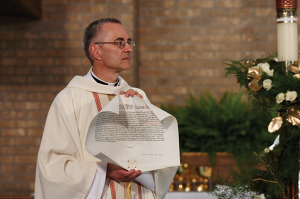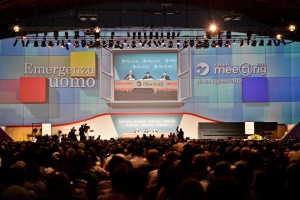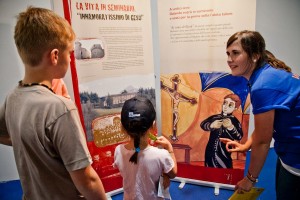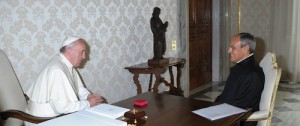Marco Bardazzi’s article for the Vatican Insider, “Church buds farewell to Fr. Albacete” gives tribute to great man of God, son of Fr Luigi Giussani.
Category: Communion & Liberation
Lorenzo Albacete, RIP
 Dear Friends,
Dear Friends,
Early this morning, Msgr. Lorenzo Albacete returned to the Father.
He lived his final days, through pain and suffering, the way he lived all of his life, in complete abandonment to Christ and His body, the Church, with unconditional gratitude.
As he clearly realized he was facing the end of his journey, full of awareness and peace and always surrounded by friends, he told us: “I lived a beautiful life; I always followed Christ. I will live as long as Christ wants me to live.”
We pray that we may have the same affection for Christ, the Church, and Fr. Giussani as our beloved Monsignor had.
Fr. José Medina, FSCB
Raica speaks of his meeting Communion and Liberation
 “I’ve developed a great appreciation for the writings of Monsignor Luigi Giussani, founder of Communion and Liberation, a mostly lay movement that began in Italy. I meet regularly with people in this area who are interested in following its charism. It’s based on the encounter with Christ that one has by the very fact that Christ took on our flesh and became one of us to show us the way back to God.”
“I’ve developed a great appreciation for the writings of Monsignor Luigi Giussani, founder of Communion and Liberation, a mostly lay movement that began in Italy. I meet regularly with people in this area who are interested in following its charism. It’s based on the encounter with Christ that one has by the very fact that Christ took on our flesh and became one of us to show us the way back to God.”
Bishop-elect Steven Raica
Gaylord, MI
This past week the Holy Father appointed Father Steven John Raica, priest and Vicar General and Chancellor of the Diocese of Lansing, MI, as the fifth bishop of Gaylord, MI. The Diocese of Gaylord is one of the newer dioceses in the USA having been established by Pope Paul VI on July 20, 1971.
For several years Father Raica, 61, has been following the ecclesial movement of Communion and Liberation and the various gestures of CL, including the annual gathering called the New York Encounter.
All of us are full of joy with the news of Father Raica being made a bishop, and a brother who makes the journey of faith in the companionship of Communion and Liberation.
“Press on to Make Him my Own”
This evening, members of the Fraternity of Communion and Liberation will embark on the annual journey of making the Spiritual Exercises given by the President of Communion and Liberation, Father Julián Carrón. His theme is taken from Saint Paul, “Press on to make Him my own.”
At this link, here is the introduction to the Exercises is given (in various languages).
Prayers are requested for the more than 140 people making the Exercises together, pressing on to make Jesus Christ our own.
Benefit for Syrian Refugee Relief in NYC
Julián Carrón speaks of Pope Francis
Dear friends,
On Friday, October 11th, I had the grace of being received in a private audience by Pope Francis. I experienced in person what we have been seeing for months, every time that he appears in public—the extreme familiarity of his entering into a relationship with the individual, even in the midst of enormous crowds.
Thus I was able to tell him about the journey that we have made in the years since Fr. Giussani’s passing. I emphasized that all of our effort was and is in function of the personalization of faith, as the only condition for being able to live, in daily reality, that newness of life that fascinated us.
At these words, the Pope went immediately to that which constitutes his fundamental concern—that every man, no matter the situation in which he finds himself, can be reached by the Christian announcement, by the mercy and the tenderness of Christ. For this reason, he insisted on the need for witness, that is, the necessity to go to meet the others—in the face of the temptation to close ourselves in defensive positions, incapable of responding to the urgency of the transmission of faith—observing that it will not be the mere “restoration” of past forms that will render Christianity present for the man of today.
I was amazed to read this week, in the Pope’s speech to the Plenary of the Pontifical Council for Promoting New Evangelization, some of the concerns that had emerged in our dialogue, and I would like to share them with you.
1) First of all, Pope Francis reminds everyone of the fact that “new evangelization” means “to reawaken the life of faith in the hearts and minds of our contemporaries. Faith is a gift from God, but it’s important that we Christians show that we live faith in a concrete way, through love, harmony, joy, suffering, because this raises questions, just as it did at the beginning of the Church’s journey: Why do they live like this? What drives them? These are questions that go to the heart of evangelization, which is the witness of faith and charity. What we need, especially now, are credible witnesses who make the Gospel visible with their lives, and also with their words, who reawaken the attraction for Jesus Christ, for the beauty of God… We need Christians who make God’s mercy, His tenderness for every creature, visible to the men of today.”
2) Thus he went on to the second aspect: “The encounter, going to meet the others. New evangelization is a renewed movement toward those who have lost faith and the profound meaning of life. This dynamism is part of Christ’s great mission to bring life into the world, to bring the Father’s love to humanity. The Son of God ‘left’ His divine condition and came to meet us. The Church is within this movement; every Christian is called to go to meet the others, to dialogue with those who have different beliefs, with those who have another faith, or who have no faith. To meet everyone, because we all have in common that we were created in the image and likeness of God. We can go to meet everyone, without fear and without giving up our belonging.”
3) Finally, he invited us to recognize that “all of this, however, is not left to chance or improvisation in the Church. It requires a common commitment to a pastoral project that recalls the essential and that is well centered on the essential, that is, on Jesus Christ. It’s of no use to get lost in many secondary or superfluous things; we must concentrate on the fundamental reality, which is the encounter with Christ, with His mercy and His love, and love our brothers and sisters as He loved us.” This “pushes us to travel new paths, with courage, without becoming fossilized! We could ask ourselves: How is the pastoral life in our dioceses and parishes? Does it make visible the essential, that is, Jesus Christ?”
I ask you to embrace Pope Francis’ question as directed at us—particularly at us, who were born only for this, as all of Fr. Giussani’s life witnesses. Does each of us, each community of our Movement, “make visible the essential, that is, Jesus Christ?”
Pope Francis confided to me that he met the Movement in Buenos Aires at the beginning of the 1990s, and that this discovery was “fresh air” for him. And this brought him to read Fr. Giussani’s texts often, because what he found in Giussani was helpful to his Christian life. Imagine how moved I was to hear these things from the man who today is the Bishop of Rome!
The Pope encourages us to live the nature of our charism personally, in the communion among ourselves, because a movement like ours is called to respond to the needs of this moment in the life of the Church and of the world.
From the closeness and familiarity of Pope Francis comes, for me and for all of us, friends, a new responsibility before God and the Church.
After having furnished the Pope with some facts about our reality—for example, regarding our presence in universities, schools, and various environments of life and work; our many attempts to respond to the needs that we intercept with gestures of charity; and the grace of the vocations to both the priesthood and consecrated life in its various forms—we took leave of each other, but not before he asked me to pray for him.
Obviously, this invitation was directed at me and at all of the Movement. For this reason, I ask you to take his request seriously, in offering and in prayer for Pope Francis every day, that God continue to give him the grace necessary to guide His Church.
And for each of us, let’s ask the Lord for the simplicity to surrender constantly to His voice, which has reached us through the unique accent of our dearest Fr. Giussani, and which continues to call us with the intensity of Pope Francis.
Full of affection, I embrace each one of you.
Fr. Julián Carrón
No need for a Protestant Giussani today: a brief response to Archie Spencer
Worshipping, preaching and witnessing Jesus Christ as the unique and only Savior of the world is a complicated issue for some Christians today.
A good refresher course in the study of Christ as Savior and Redeemer would be situated in the CDF document Dominus Iesus (2000), or something more substantive as Jesuit Father Edward Oakes’ recent book, Infinity Dwindled to Infancy: A Catholic and Evangelical Christology (Eerdmans, 2011). There are other books to recommend but I am not writing to make those suggestions.
Archie Spencer,ThD, an Evangelical Christian theologian wrote a piece titled: “We stand in need of Protestant Giussani today.” Dr Spencer is a competent theologian with interests in a wide variety of reformed and evangelical matters including Christology. He teaches Systematic Theology at Northwest Baptist Seminary (Canada). In fact, he’s interested in the Christological controversies Christianity faced in the first three centuries of salvation history, particularly the Alexandrian type. Spencer is also versed in the method of Communion and Liberation and its founder, Father Luigi Giussani. In my opinion, Spencer wrote a well thought-out essay (noted above); Catholics and mainline Protestants ought to read Spencer’s article (and then re-read it) for he clarifies the key point of what it means to be saved by Jesus Christ. He, however, opens a can worms that many in the Protestant world find difficult to preach today: Truth is objective, personal, merciful and exclusive.
It can be argued that orthodox Catholics converge with the Evangelicals in ways (e.g., Christology) many mainline Protestants do not today. I appreciate much of what he proposes: Jesus Christ is either the center of my life, or He’s not; either Christ is my only Savior, or He’s not. Right-believing, right-worshipping and right-living Christians can’t utilize other methods for Christian life. BUT Dr Spencer doesn’t complete the case.
Respectfully, I note two glaringly missing points in Spencer’s article: (1) Christians can’t be satisfied with the separation of the Body of Christ (the Church) with various ecclesial communities; the divisions among Christians is a scandal for those baptized in Jesus Christ. The other matter missing (2) is the issue of right-worship –the sacred Liturgy and sacraments administered by a valid priesthood is the only realistic way to make Christ known, lived and proposed to the world. Protestant worship is missing some very essential matters of right belief. The lex orandi tradition is very limited in Evangelical, Lutheran and Anglican (Protestant) worship.
Hence, I would never be able to support the idea that Christians in other ecclesial communities need a “new” Giussani without wrestling in a more direct way with the fact that unity among Christians and a proper, that is, faithful worship are non-negotiables and that we can’t be satisfied with the religious status quo. To love Luigi Giussani and his Christocentricism is to be catholic and to live the Catholic faith. Christians, including Catholics and Orthodox have Luigi Giussani pointing the way, and exhorting us to live under the banner of Jesus Christ in a Church that lives properly the faith handed down to us from Apostolic times. I doubt that Giussani would say that it is a good thing to keep the divisions in Christianity alive and to worship without the Eucharist and the other sacraments as a reasonable proposal. Giussani always points in an uncompromising way to the fullness of truth as lived in the Roman Church (even to the point of accepting the Church of the millennium).
It is theologically and humanly incoherent to believe otherwise.
34th Rimini Meeting gathers, Pope sends message
 The 34th Meeting for the Friendship Among the Peoples opened in Rimini, Italy on 18 August. The for this year is “The Human Person: a State of Emergency.”
The 34th Meeting for the Friendship Among the Peoples opened in Rimini, Italy on 18 August. The for this year is “The Human Person: a State of Emergency.”
The Holy Father through the Secretary of State to His Holiness, Tarcisio Card. Bertone, SDB, sent a letter to the bishop of Rimini, the Most Reverend Francesco Lambiasi.
The Meeting is a work of members of Communion and Liberation and it draws around 800K, from Italy and many countries beyond. In past years the Meeting has welcomed the brilliant contributions, among many, of Blessed John Paul II, Blessed Teresa of Calcutta, the Servant of God Father Luigi Giussani, Benedict XVI (when he was the CDF Prefect), Ennio Morricone, David Rosen, Tony Blair and Carl A. Anderson.
The Program for this year…
Here’s Pope Francis’ message…
Most Reverend Excellency, I would like to address with joy the Holy Father Francis’ cordial greeting to Your Excellency, to the organizers and to all the participants in the Meeting for the Friendship Among the Peoples that is now being held for the 34th time. The theme chosen – The Human Person: a State of Emergency – captures the great urgency of evangelization, which the Holy Father following His predecessors, has underlined many times and which caused in Him deep considerations that now I refer here below.
In his first Encyclical, Redemptor hominis (cfr. n. 14), the beatified John Paul II wrote that “man is the way for the Church.”
This truth is still valid, especially in this period in which the Church is called to rediscover its own mission, focusing on the essential and searching for new paths for evangelization, in a more and more globalized and virtual world and in a society more and more deprived of stable reference points.
Man remains a mystery, irreducible to whatever image society creates and the power of the world tries to impose to him. The man is a mystery of freedom and grace, of poverty and grandness. But what does it mean: “Man is the way for the Church?” And especially, what does it mean for us today to walk through this way?
Man is the way for the Church because he is the road that God Himself walks on. From the dawn of humanity, after the Original Sin, God has begun to search for man. “Where are you?” He asks Adam, who is hiding in the garden (Gen 3, 9). This question, that appears at the beginning of the Book of Genesis, and that doesn’t stop resonating throughout the entire Bible and in every moment of the history that God, throughout the millennia, created with humanity, reaches its highest expression through the incarnation of the Son. In his commentary on John’s Gospel, Saint Augustine affirms that: “Remaining with the Father, [the Son] was truth and life; taking our flesh, He became the way” (I, 34, 9). Therefore Jesus Christ is “the chief way for the Church,” but since “He is also the way for each man”, man becomes “the prime and fundamental way for the Church.” (Redemptor hominis, 13-14)
 Jesus affirms “I am the gate” (John 10,7): that means, I am the access portal for every man and everything. Without passing through Christ, without concentrating on Him the gaze of our heart and mind, we would not understand anything of the mystery of the human person. Therefore, almost inadvertently, we will be forced to acquire from the world our criteria of judgment and action, and every time we get closer to our brothers in humanity, we will be like those “thieves and robbers” that Jesus talks about in the Gospel (John 10,8). Even the world is in fact, in its own way, interested in man. The economic, political and social power needs man to maintain and inflate itself. And for this reason, the power frequently tries to manipulate the masses, it creates desires to eliminate the most precious thing man possesses: his relationship with God. The power fears those men that have a relationship with God because this relationship sets them free.
Jesus affirms “I am the gate” (John 10,7): that means, I am the access portal for every man and everything. Without passing through Christ, without concentrating on Him the gaze of our heart and mind, we would not understand anything of the mystery of the human person. Therefore, almost inadvertently, we will be forced to acquire from the world our criteria of judgment and action, and every time we get closer to our brothers in humanity, we will be like those “thieves and robbers” that Jesus talks about in the Gospel (John 10,8). Even the world is in fact, in its own way, interested in man. The economic, political and social power needs man to maintain and inflate itself. And for this reason, the power frequently tries to manipulate the masses, it creates desires to eliminate the most precious thing man possesses: his relationship with God. The power fears those men that have a relationship with God because this relationship sets them free.
This is the state of emergency of the human person the Meeting for the Friendship Among the Peoples has chosen as its main theme this year: the urgency to give back man to himself, at his highest dignity, to his own uniqueness and preciousness of each human existence from his conception to the natural end of life.
It is necessary to take into consideration again the sacredness of man and, at the same time, to strongly state that only in the relationship with God, that is in the discovery and adhesion of one’s own vocation, that man can achieve his true stature.
The Church to which Christ entrusted His Word and Sacraments takes care of the greatest hopes, the most authentic possibility of fulfillment for man, in any place and any time. What a big responsibility we have! Do not keep just for us this precious treasure that everybody, aware or not, is looking for himself or herself.
Let’s meet with courage all the men and women of our time, children and old people, “wise” people and those without education, young and families. Let’s meet everybody and do not wait the others to look for us! Let’s imitate in this our Divine Master, who left His Heaven to become man and to be closed to everybody. Let’s bring the perfume of Christ’s love (2 Cor 2,15) not only in churches and parishes, but in every environment. In the schools, in the universities, in workplaces, in hospitals, in prisons; but also in the city squares, in the streets, in the sport centers, in places where people gather. Don’t be greedy in giving what we have gained without any merit! Let’s not be afraid to announce Christ in favorable or unfavorable occasions (2 Tm 4,2) with respect and frankness. This is the Church’s task, this is every Christian’s task: to serve men and look for them even in the social and the most inner spiritualist corners.
The condition of credibility of the Church in its mission of mother and teacher is its fidelity in Christ. The openness towards the world is accompanied and, in a certain sense, is possible thanks to the obedience to the truth of which the Church itself cannot dispose. “The Human Person: a State of Emergency” thus signifies the urgency to go back to Christ, to learn from Him the truth about ourselves and the world and with Him and in Him to go and meet every man, especially the poorest, for which Jesus has always manifested His predilection. And poverty is not only material. There is a spiritual poverty that grips every contemporary men. We are poor in love, thirsty for truth and justice, beggars of God, as wisely the servant of God Father Luigi Giussani has always underlined. The greatest poverty is in fact the lack of Christ, and until we do not bring Jesus to people, we would have done too little for them.
Your Excellency, I hope these brief thoughts may help those who are taking part in the Meeting. His Holiness Pope Francis assures everybody His closeness in prayer and His affection. He hopes that the meetings of these days may light in the hearts of all the participants a fire that nourishes and sustains their testimony of the Gospel in the world. And we send a particular Apostolic Benediction to You, to all the responsible people, the organizers of this manifestation, as well as those who are present.
What friendship can do… celebrating Verdi with the Little Prince School in mind
I am sure you know that the famed composer Giuseppe Verdi is celebrating his 200th birthday this year. What you may not be aware of is that the attendees of the Ravenna Festival on July 13th became friends with 350 students at the Little Prince School in Nairobi, Kenya. Distance is no barrier for friendship with students.
While attending the Verdi opera Nabucco (a four act opera composed in 1841) directed by famed Italian Conductor Riccardo Muti, the attendees marvelously generated a $9,000 gift for Little Prince School. Cristina Muti the director of Ravenna Festival sat in the booth drawing people to be generous. The Little Prince School is supported by AVSI, an international aid, educational and cultural organization.
More on this beautiful event can be found here.
AVSI stands for The Association of Volunteers in International Service, founded in 1972 in Italy. Its NYC doors opened in 2001 and they have an office in Washington, DC. It works in 38 countries. AVSI’s method of aid is based on personal friendship through a network of interested peoples. Hence, the principles are:
- Centrality of the person
- Starting with the positive
- Do with
- Development of Civil Society and Subsidiarity
- Partnership
AVSI is directed by Catholic Social Teaching and inspired by the life of the ecclesial movement Communion and Liberation founded by the Servant of God Father Luigi Giussani.


